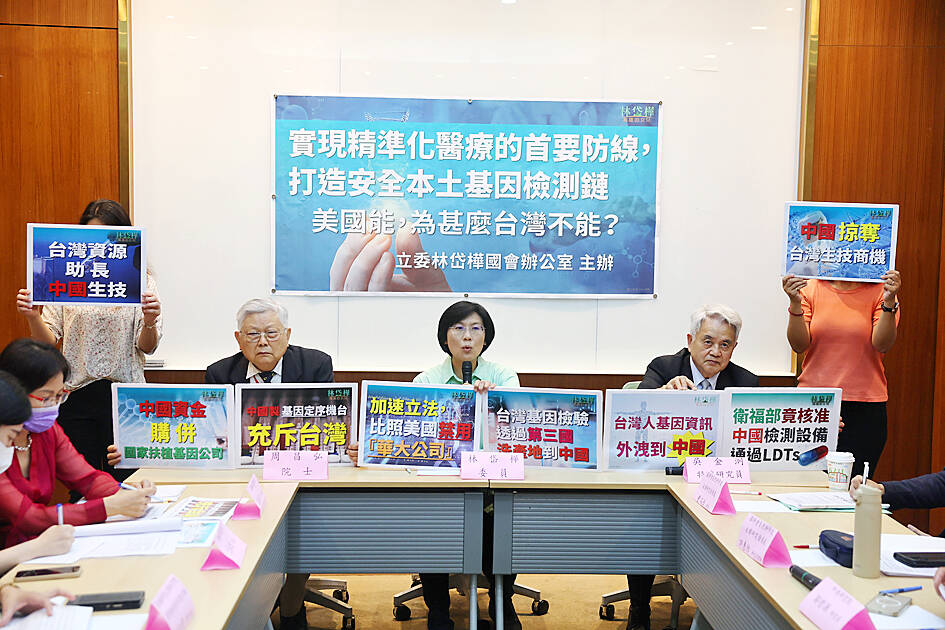Taiwan’s laws should be amended to help prevent genetic data from leaking to China and to establish a domestic genetic testing industrial chain, Democratic Progressive Party (DPP) Legislator Lin Tai-hua (林岱樺) said yesterday.
Precision medicine has become a global trend in the past few years, while Taiwan’s medical sector has been promoting genetic testing in advanced precision and personalized medicine to improve treatment efficacy and medical resource utilization, Lin told a news conference in Taipei.
However, media have reported that Chinese gene company BGI Genomics Co Ltd, which sells one of the most popular prenatal tests in the world, has harvested genetic data from millions of women, and is facing scrutiny from regulators in Australia, Canada, Germany and other countries, she said.

Photo: CNA
Human genetic data are a fundamental resource for scientific research and valuable for the biomedical industry, but there are concerns that genetic data collected in Taiwan might be leaked to China, she said.
DNA sequencing machines in Taiwan being made in China, specimens from genetic testing being sent to China from third countries for sequencing, the government granting Laboratory Developed Test certification to Chinese testing devices, state-supported gene companies merging with firms that the Chinese government has stakes in and genetic data of Taiwanese being leaked to China are among the concerns, Lin said.
Wu Jen-leih (吳金洌), a visiting fellow at Academia Sinica’s Institute of Cellular and Organismic Biology, said that the source of genetic data leaks is the Chinese machines used for gene sequencing.
Sometimes specimens are sent directly to China or other countries to be sequenced, Wu said.
National security might be affected if the data are used for destructive purposes, he said.
Whoever controls the information has an advantage in biomedical technology development, but while many countries are adopting stricter measures regarding Chinese-made genetic testing products and sequencing machines, Taiwan lacks vigilance and even allowed several medical centers to install BGI Genomics sequencing machines, he said.
Chou Chang-hung (周昌弘), a professor in Academia Sinica’s Institute of Plant and Microbial Biology, said that Chinese firms have merged with gene companies in Taiwan, obtaining their databases and sending specimens to China.
The problem is similar to how seedlings and genomic data of special pineapple varieties being obtained by China harms Taiwanese agriculture, Chou said.
Regardless of how genetic data are acquired from Taiwanese, it seriously harms the genetic testing industry in Taiwan and supports the industry in China, when they are sent across the Taiwan Strait, he said.
The government should thoroughly investigate the use of Chinese genetic tests and sequencing machines in Taiwan, amend the law to control the export of genetic data, and support research projects to help Taiwan establish a domestic genetic testing industrial chain, Lin said.

Taiwan has received more than US$70 million in royalties as of the end of last year from developing the F-16V jet as countries worldwide purchase or upgrade to this popular model, government and military officials said on Saturday. Taiwan funded the development of the F-16V jet and ended up the sole investor as other countries withdrew from the program. Now the F-16V is increasingly popular and countries must pay Taiwan a percentage in royalties when they purchase new F-16V aircraft or upgrade older F-16 models. The next five years are expected to be the peak for these royalties, with Taiwan potentially earning

POSITIVE DEVELOPMENT: Japan and the US are expected to hold in-depth discussions on Taiwan-related issues during the meeting next month, Japanese sources said The holding of a Japan-US leaders’ meeting ahead of US President Donald Trump’s visit to China is positive news for Taiwan, former Japan-Taiwan Exchange Association representative Hiroyasu Izumi said yesterday. After the Liberal Democratic Party’s landslide victory in Japan’s House of Representatives election, Japanese Prime Minister Sanae Takaichi is scheduled to visit the US next month, where she is to meet with Trump ahead of the US president’s planned visit to China from March 31 to April 2 for a meeting with Chinese President Xi Jinping (習近平). Japan and the US are expected to hold in-depth discussions on Taiwan-related issues during the

‘LIKE-MINDED PARTNER’: Tako van Popta said it would be inappropriate to delay signing the deal with Taiwan because of China, adding he would promote the issue Canadian senators have stressed Taiwan’s importance for international trade and expressed enthusiasm for ensuring the Taiwan-Canada trade cooperation framework agreement is implemented this year. Representative to Canada Harry Tseng (曾厚仁) in an interview with the Central News Agency (CNA) said he was increasingly uneasy about Ottawa’s delays in signing the agreement, especially as Ottawa has warmed toward Beijing. There are “no negotiations left. Not only [is it] initialed, we have three versions of the text ready: English, French and Mandarin,” Tseng said. “That tells you how close we are to the final signature.” Tseng said that he hoped Canadian Prime Minister Mark Carney

STAY IN YOUR LANE: As the US and Israel attack Iran, the ministry has warned China not to overstep by including Taiwanese citizens in its evacuation orders The Ministry of Foreign Affairs (MOFA) yesterday rebuked a statement by China’s embassy in Israel that it would evacuate Taiwanese holders of Chinese travel documents from Israel amid the latter’s escalating conflict with Iran. Tensions have risen across the Middle East in the wake of US and Israeli airstrikes on Iran beginning Saturday. China subsequently issued an evacuation notice for its citizens. In a news release, the Chinese embassy in Israel said holders of “Taiwan compatriot permits (台胞證)” issued to Taiwanese nationals by Chinese authorities for travel to China — could register for evacuation to Egypt. In Taipei, the ministry yesterday said Taiwan